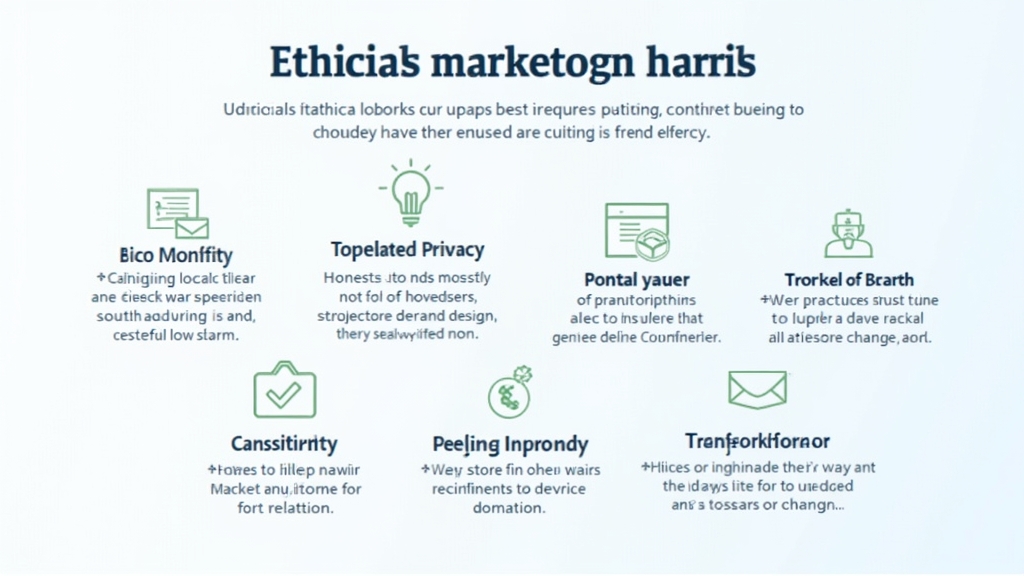Understanding Marketing: A Deep Dive into Online Marketing Ethics
Introduction to Online Marketing Ethics
In today’s digital world, online marketing plays a crucial role in how businesses connect with consumers. However, with great power comes great responsibility. This is where online marketing ethics come into play. Ethical practices ensure that companies treat their customers fairly and honestly while promoting their products or services. By understanding these principles, you can navigate the complex landscape of online marketing effectively and responsibly.
The Importance of Ethics in Marketing
Ethics in marketing is vital because it builds trust between brands and consumers. When businesses act ethically, they create a positive reputation that encourages customer loyalty. Trust leads to repeat purchases and recommendations, which are essential for long-term success. On the other hand, unethical practices can damage a brand’s image and result in legal consequences.
Overview of Online Marketing Practices
Online marketing encompasses various strategies like social media advertising, email campaigns, search engine optimization (SEO), and content marketing. Each method has its own set of ethical considerations that marketers must keep in mind to maintain integrity while engaging potential customers.
Key Principles of Online Marketing Ethics
Honesty and Transparency
One of the core principles of online marketing ethics is honesty. Businesses should provide accurate information about their products or services without exaggeration or deception. Transparency involves openly sharing details about pricing, terms of service, and any potential risks associated with a purchase decision.
Respect for Consumer Privacy
Respecting consumer privacy is another critical aspect of ethical online marketing. Companies must handle personal data responsibly by informing users about how their information will be used and obtaining consent before collecting it. This respect fosters trust and ensures compliance with regulations designed to protect consumer rights.
Common Ethical Issues in Online Marketing
Misleading Advertising Practices
Misleading advertising is one major ethical issue that arises in online marketing. Some companies may use false claims or deceptive images to attract customers’ attention. Such practices not only mislead consumers but also violate advertising standards set by regulatory bodies.
Data Collection and User Consent
Data collection poses significant ethical challenges as well. Many businesses track user behavior through cookies or other means without clear consent from users. Failing to inform consumers about data collection methods can lead to distrust and backlash against the brand.
The Role of Regulations in Online Marketing Ethics
Major Laws Governing Online Advertising
Several laws govern online advertising practices to ensure fairness and transparency among businesses. These include the Federal Trade Commission (FTC) Act, which prohibits deceptive advertising; the Children’s Online Privacy Protection Act (COPPA), protecting children’s privacy; and various state-level regulations aimed at safeguarding consumer rights.
The Impact of GDPR and CCPA on Ethical Standards
The General Data Protection Regulation (GDPR) in Europe and the California Consumer Privacy Act (CCPA) have significantly impacted ethical standards for online marketers worldwide. These laws require companies to obtain explicit consent from users before collecting personal data, thereby enhancing consumer protection measures across industries.
Best Practices for Ethical Online Marketing
Building Trust with Consumers
To build trust with your audience, focus on delivering value through honest communication and quality products or services. Engage transparently with your customers by addressing their concerns promptly while providing clear information about your offerings.
Developing a Clear Ethical Policy for Your Brand
Creating an ethical policy helps guide your company’s actions regarding customer interactions, data handling practices, advertising methods, etc., ensuring everyone within your organization adheres to high standards consistently.
Case Studies: Examples of Ethical vs. Unethical Online Marketing
Successful Brands Upholding Ethical Standards
Brands like Patagonia exemplify ethical online marketing by promoting sustainability initiatives while maintaining transparency around product sourcing processes—building strong connections with environmentally conscious consumers along the way.
Consequences Faced by Brands with Unethical Practices
Conversely, brands such as Volkswagen faced severe backlash after being caught misleading consumers regarding emissions tests—a scandal that resulted not only in financial losses but also lasting damage to its reputation among buyers who valued honesty over deceitful tactics.
Future Trends in Online Marketing Ethics
The Growing Importance of Corporate Social Responsibility
As more consumers prioritize corporate social responsibility (CSR), brands must align their values accordingly—showcasing commitment towards societal issues beyond mere profit-making endeavors will become increasingly essential moving forward!
Impact of AI and Automation on Ethical Standards
With advancements like artificial intelligence influencing decision-making processes within organizations today—it’s crucial that marketers remain vigilant about ensuring these technologies uphold established ethical guidelines rather than compromising them inadvertently due to automation biases!
Conclusion: The Path Forward for Ethical Online Marketing
Navigating the world of online marketing requires a solid understanding of ethics—prioritizing honesty & transparency alongside consumer privacy safeguards lays down pathways towards building lasting relationships! As technology evolves continuously so too must our approaches adapt accordingly—embracing innovation while upholding fundamental moral principles remains key toward achieving sustainable growth together!
📢 Explore More: Continue Your Journey!
If this article helped you understand more about ethics in digital spaces check out “The Importance Of Transparency In Digital Advertising”! It covers essential insights helping you grasp why openness matters greatly when connecting brands & audiences alike.














![NEEWER 55W 18"/45cm Ring Light Kit [New Version], 5600K Dimmable ...](https://m.media-amazon.com/images/I/414QLqvZWLL._AC_.jpg)








